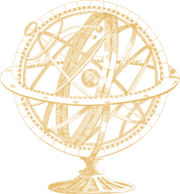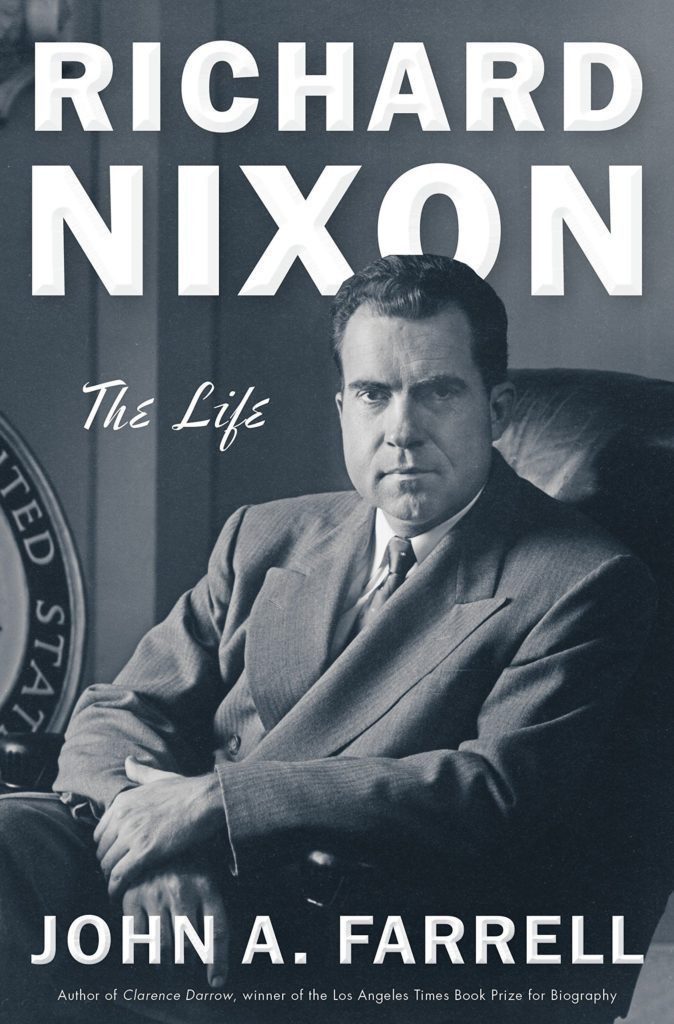“I think the country doesn’t give much of a shit about it…It’s politics. That’s my view. The purists probably won’t agree with that, but I don’t think they’re going to see a great uproar in the country about the Republican committee trying to bug the Democratic headquarters.”
Richard Nixon to his Chief of Staff as deatils of the Watergate Scandal became public
Here’s the bitch of it: Nixon didn’t even need Watergate. He would have won anyway. But I’m getting ahead of myself.
After leaving the Lyndon Johnson biography feeling woefully underserved by my book choice I opted to up the page count for one of the most notorious – and, surprisingly, potentially great – presidents in US history. John A. Farrell’s Richard Nixon: The Life provided an balanced analysis about a president who has been parodied in pop culture via everything from Halloween mask-wearing bank robbers to a cartoon floating head ruling over future Earth. I won’t dive too deep into the details of Watergate given its ubiquity, but if you want a quick timeline/primer for the sake of context, you can check out this link.
Back to winning without Watergate. Richard Nixon probably would have been reelected even if he hadn’t campaigned for a single vote. Nixon’s reelection win over Democrat George McGovern in 1972 was so lopsided (How lopsided was it?!) that if you just stole a glance at the election map you’d think it was solid Republican red. McGovern picked up Massachusetts, Washington D.C. and one elector in Virginia. That’s it. Disregarding the unopposed elections of George Washington (twice) and James Monroe (once), Nixon’s electoral college vote win over McGovern was bested on only two occasions: FDR’s first re-election in 1936 as he was pulling the country out of the Great Depression and Ronald Reagan’s 1984 re-election when he was at the peak of his cultish popularity. Nixon still holds the record for the largest popular vote margin, beating his donkey-logoed foe by 18 MILLION VOTES. Tapping a hotel room phone can’t buy you that many ballots.
Richard Milhous Nixon could have been one of the all-time great American Presidents. Instead, he became the only one ever to resign, doing so in shame as he cowered away under the specter of election fraud and pending impeachment. This was due, at least in part, to the fact he was paranoid to a fault. Aides feared him and learned never to oppose him openly, which created a negative feedback loop rife with leaks and spying and zero trust, feeding the paranoia further. Watergate wasn’t a master plan; it was the manifestation of a nervous tic.
“Tricky Dick” made his way in the political world as the ultimate backroom operator. In 1952, then-Senator Nixon was angling to become the Republican choice for Vice President in the upcoming election. On the long train ride from Southern California to Chicago to attend the nominating convention, he spent the whole voyage drumming up delegate support for Eisenhower, assuming (correctly) that Ike would get the nod and reward the enterprising young Californian for his help in winning the west. Politicos at the time called it “the great train robbery.”
Years later, this time as a presidential candidate, he would be embroiled in The Chennault Affair, which sought to delay peace talks to end the Vietnam War until Nixon got elected, so he could take credit. This was also around the time when he named then-Maryland governor/lowlife grifter Spiro Agnew as his running mate. Agnew was often used as a surrogate thug to shout down the media as a group of liars and liberals (#fakenews). This way, Nixon could ostensibly keep his own hands clean while disenfranchising the newsmen. To quote former vice president Agnew, “Dividing the American people has been my main contribution to the national political scene. I not only plead guilty to the charge, but I am somewhat flattered by it.” The Washington Post called choosing him “perhaps the most eccentric political appointment since the Roman emperor Caligula named his horse consul.”
Hold on. Where is all that “could have been a great president” stuff?
For starters, a 2012 poll of major environmental organizations – including the Sierra Club and Greenpeace – listed Nixon as second only to Teddy Roosevelt in presidential contribution to environmental protections. That one shocked me. But the facts speak for themselves. Nixon created the Environmental Protection Agency by executive order. The National Oceanic and Atmospheric Administration (NOAA) was created on his watch, providing coastal resource management and climate education among other services. He signed the Clean Air Act of 1970, dramatically enhancing the ability of federal and state governments to limit air pollution, and the Clean Water Act two years later. Nixon even planted a tree on the White House lawn on the first Earth Day.
There are several actions that could be blog posts unto themselves. For example, Nixon opened diplomatic relations with China for the first time in decades, laying the groundwork for the most powerful commercial trading relationship in the world. He signed Title IX into law (as part of the Education Amendments Act of 1972) ending discrimination based on sex and providing a monumental boost to women’s access to education and sports. He ended the military draft and lowered the voting age to 18. These are consequential things! And they all still profoundly affect the lives of Americans today.
Lastly, his record on race had a ton of potential. Nixon spoke up for civil rights several times during his 1946 campaign for the US House, denouncing racists as equally dangerous as Communists. He gained honorary membership to his local NAACP chapter. While VP, Nixon fought to pass the Civil Rights Act of 1957 and received this thoughtful (if cautious) appraisal from none other than Martin Luther King, Jr.: “It is altogether possible that he has no basic racial prejudice. I am coming to believe that Nixon is absolutely sincere about his views on the issue…I must admit, I was strongly opposed to Vice President Nixon before meeting him personally…I remembered his statements against Helen Gahagan Douglas and also the fact that he voted with the Right Wing of the Republican Party. These were almost unforgivable sins for me at that time. After meeting the Vice President, however, I must admit that my impression somewhat changed. I have frankly come to feel that the position and the world contacts of the Vice President have matured his person and judgment. Whether he can have experienced a complete conversion, I cannot say. But I do believe that he has grown a great deal.”
Unfortunately, Nixon’s enlightenment ultimately couldn’t hold up under the strain of campaign posturing once he sought the presidency. To quote the author at length: “Nixon reverted to Eisenhower-era rhetoric, equating civil rights leaders who wanted “instant integration” with bigoted extremists who were preaching “segregation forever.”…Over time, the president of the United States gave credence to the feelings, shared by millions and fanned by [third-party candidate George] Wallace and his kindred, that blacks were ingrates, offenders, and welfare chiselers handed unfair advantages by dizzy Democrats at the expense of hardworking, law-abiding citizens. It was during the Nixon years…that the cause of civil rights lost an invaluable asset – the moral presence of the presidency.” Much like the folly of Watergate, Nixon would let the idea that “it’s just politics” overshadow any past traces of principle.
The real shame is that Richard Nixon didn’t have enough faith in his own intellect to heed his better angels. I really do think he could have been one of the greats if he had. Instead, jealousy, greed and a lust for power drove the 37th President of the United States to ruin. Somehow, the man called a hyena and a poison toad by writer Hunter S. Thompson was the same man about whom evangelist Billy Graham once said, “There are few men who have loved you as I love you.” What a life.
Trivia
- One of his ancestors, George, served under Washington during the American Revolution at Trenton and Princeton and the Battle of Brandywine.
- Another George (grandson of the above, great-granddad to Richard) died fighting for the Union in the Civil War at Gettysburg.
- Dwight Eisenhower’s son David married Nixon’s daughter Julie.
- Graduate of Duke Law School
- Excelled in high school and could have gone to Harvard or Yale but his family’s finances would not allow. Instead went to Whittier College, enrollment 400. Lived at home and kept working in his father’s grocery store.
- Wrote nine books after leaving office.
- Between stints as VP and president he argued a case in front of the Supreme Court.
- When Ike had a heart attack, Nixon and Deputy Attorney General Rogers realized they didn’t actually know what the Constitution said about succession. Rather than call someone and out themselves, they found a copy in the Farmer’s Almanac.
- When Ike had a third health scare in early 1958, he outlined the process by which the VP would be declared or able to declare himself President. This process was formally adopted as the 25th Amendment in 1967.
- Ike added “under God” to the pledge of allegiance and Nixon started the American-flag-pin-on-lapel trend.
- Debated JFK as a fellow congressional freshman in McKeesport, PA about union contracts. Nixon “won”. A dozen years later, this time vying for the White House, it wouldn’t go as well for Dick.
- Once turned down a colleague soliciting his help to campaign for Attorney General of Massachusetts since JFK was running for Senate there. Nixon didn’t want to endorse the Republican candidate against Jack saying, “I know Kennedy and I have a fairly high regard for him. It would be difficult for me.”
- He might have regretted that. The 1960 presidential race was a razor thin loss to JFK. If 12,000 people across IL, NV, NM, HI and MO had voted Republican, Nixon would have won.
- Dropped the gold standard, announced Aug 15, 1971. Helped him get reelected but the cost-of-living for American households rose by almost 10% in 1973 and by over 12% in 1974, the worst peacetime inflation in US history.
Follow-up Reading
- President Nixon: Alone in the White House by Richard Reeves
- Richard Milhous Nixon: The Rise of An American Politician by Roger Morris
- The Final Days by Bob Woodward and Carl Bernstein

